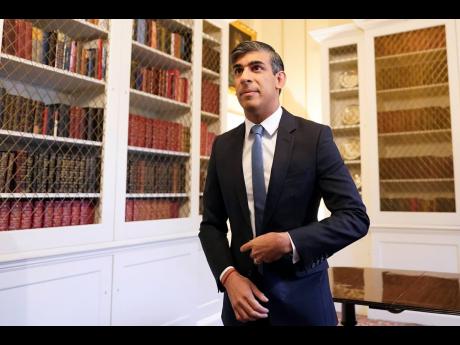UK inflation lowest in three years
PM Sunak makes it a focus, election set for July 4
Inflation in the United Kingdom fell sharply to its lowest level in nearly three years in April on the back of big declines in domestic bills, official figures showed on Wednesday.
The drop was widely seen as a trigger for Prime Minister Rishi Sunak calling a general election for July 4.
The Office for National Statistics said inflation, as measured by the consumer prices index, fell to 2.3 per cent in the year through to April, down from 3.2 per cent in March.
That is the lowest level since July 2021, when the global economy was still being held back by the coronavirus pandemic. The fall also takes inflation nearer to the Bank of England’s target rate of 2.0 per cent and is likely to pile pressure on its nine-member rate-setting panel to cut interest rates from the current 16-year high of 5.25 per cent.
The next rate meeting is on June 20 and many economists think the bank will cut borrowing costs. However, others think that ongoing concerns on the panel over the scale of price rises in the crucial services sector and the pace of wage increases, which raise the risks of an inflation rebound if interest rates are cut too soon, make an August reduction more likely.
Though the latest fall in inflation is welcome, it didn’t drop as far as some economists had hoped. It also doesn’t mean the cost of living crisis – the worst in around 40 years – is over. Lower inflation, after all, just shows that prices are rising more slowly than they were before.
“Consumers are still living with far higher prices, and how you take today’s inflation data will depend on whether your glass is half-full or half-empty,” said James Smith, research director at the Resolution Foundation. “While it’s clearly good news, headline inflation is back to normal levels, it is disappointing that price pressures haven’t fallen further and that measures of services inflation are proving more stubborn than expected.”
Inflation hit a high above 11 per cent at the end of 2022 in the wake of Russia’s invasion of Ukraine, which led to sharp increases in energy costs.
Over the past couple of years, goods and services have risen by 15 per cent, with food prices up even more at around 25 per cent.
The Bank of England, like the United States Federal Reserve and other central banks around the world, raised interest rates aggressively in late 2021 from near zero to counter price rises first stoked by supply chain issues during the coronavirus pandemic and then by Russia’s invasion of Ukraine.
Higher interest rates – which cool the economy by making it more expensive to borrow, thereby bearing down on spending – have contributed to bringing down inflation worldwide. Figures last week showed that the British economy has started growing again.
Britain’s governing Conservative Party hopes that lower inflation and economic recovery will trigger a feel-good factor ahead of the general election, the date of which Sunak confirmed later Wednesday. Opinion polls suggest that the main opposition Labour Party is ahead of the Conservatives, who have been in power since 2010.
“This morning it was confirmed that inflation is back to normal,” Sunak said when announcing the election date. “This means the pressure on prices will ease and mortgage rates will come down.”
Labour’s economy spokesperson Rachel Reeves said “now is not the time for Conservative ministers to be popping champagne corks and taking a victory lap”.
The July 4 election comes amid a divided and demoralised Conservative Party, which looks likely to lose power after 14 years.
The centre-left Labour Party is strongly favoured to defeat Sunak’s party. Labour leader Keir Starmer said his party would bring stability.
But Sunak has vowed to fight for every vote.
“Today marks a major moment for the economy, with inflation back to normal,” Sunak said ahead of the election announcement. “Brighter days are ahead, but only if we stick to the plan to improve economic security and opportunity for everyone.”
Voters across the United Kingdom will choose all 650 members of the House of Commons for a term of up to five years. The party that commands a majority in the Commons, either alone or in coalition, will form the next government and its leader will be prime minister.
Starmer, a former chief prosecutor for England and Wales, is the current favourite. The party’s momentum has built since it dealt the Conservatives heavy losses in local elections earlier this month.
The Conservatives have also lost a series of special elections for seats in Parliament this year, and two of its lawmakers recently defected to Labour.
Elections in the UK have to be held no more than five years apart, but the prime minister can choose the timing within that period. Sunak, 44, had until December to call an election. The last one was in December 2019.
AP

